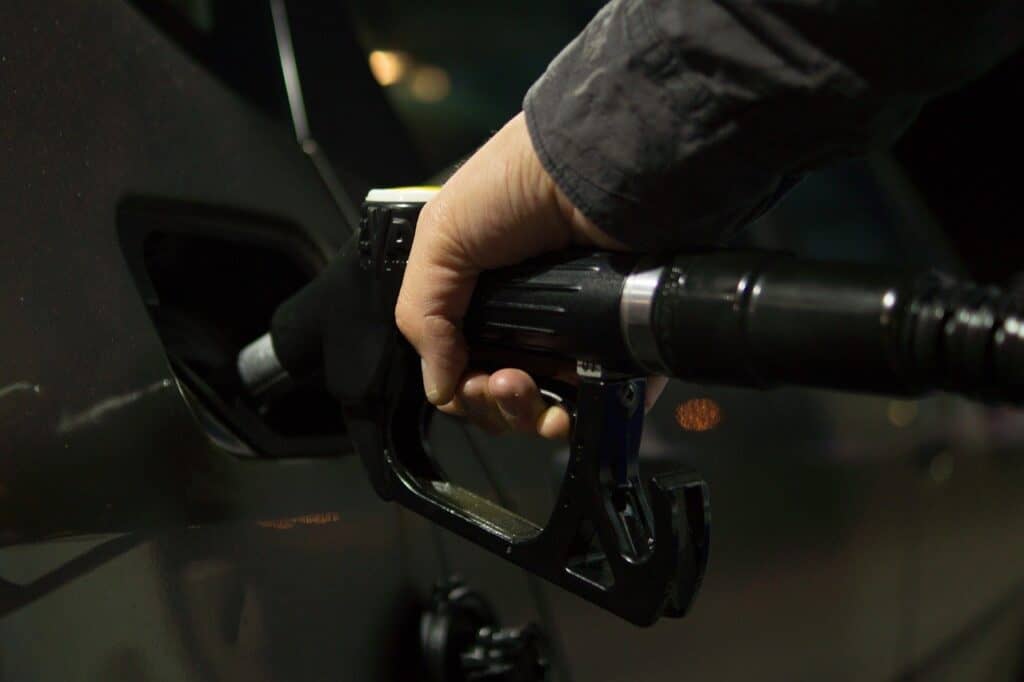Natural gas is a very popular fuel source, and many homes will use natural gas along with its widespread use in industry. The main reason for its popularity is that it burns relatively cleanly and is generally considered to be less harmful to the environment than other fossil fuels. But does the fact that natural gas is used as a fuel make it flammable and if not, why not?
Natural gas will certainly ignite and burn, but it is not as flammable as most people think. The ignition temperature of natural gas is 1,200 degrees Fahrenheit (648.89 Celsius), which means that it is not as flammable as many other gases. You also need a fairly specific blend of natural gas to air for it to burn.
Now, there are still some very serious fire safety concerns when it comes to natural gas. Just because it does not ignite as easily as something like hydrogen, does not mean that it won’t burn. Here’s what you need to know.
Your # 1 priority is keeping your family safe. As a firefighter, I recommend everyone has updated smoke detectors that don’t require battery changes, like these ones from Kidde, a fire extinguisher, like this one from Amerex, and a fire escape ladder if you have bedrooms above the first floor, I recommend this one from Hausse.
Also read: What Makes Something Flammable?
What Is Natural Gas?
Natural gas (which is sometimes referred to as “gas” in certain countries but shouldn’t be confused with gasoline) is a mixture of different hydrocarbon gasses.
The main constituent is methane but there are longer chain alkanes present in the mix and also possibly carbon dioxide, helium, hydrogen sulfide, and nitrogen.
Like other fossil fuels, natural gas is created by the decay of plant and animal material under the surface of the Earth and the process takes place over many millions of years.
It is a non-renewable resource which means that when natural gas is burned it won’t be replaced by other fuels formed from the reaction of burning.
While natural gas is considered to be “clean” burning, it’s worth noting that it is a greenhouse gas and if it’s allowed to escape into the atmosphere and when it’s burned one byproduct of the reaction is carbon dioxide, which is also a greenhouse gas.
While many mining and drilling operations center around the production of natural gas, it may also be a product of petroleum drilling operations where typically it is not harvested but simply burned off as flare gas.
Natural gas must be processed and cleaned before it is sold for use in industry and homes to remove impurities.
Also read: Is Hydrogen Flammable? Explosions…
Is Natural Gas Flammable?
Natural gas is a peculiar thing.
It’s used as a fuel, so, of course, natural gas burns.
But it’s nowhere near as flammable as you might expect.
As we’ve already seen it has a high ignition point of 1,200 degrees Fahrenheit.
But it also requires a mixture of between 5% and 15% natural gas to air to catch fire at all.
If there is more or less gas? It won’t burn.
This video goes into more detail about natural gas:
Also read: Is Nitrogen/Liquid Nitrogen Flammable?
Does It Ignite Easily?
No, natural gas doesn’t ignite easily, and, in fact, this is one of the reasons that it’s used as a fuel so commonly.
If natural gas were highly flammable and easy to ignite, it would be a major safety risk and require strict storage and usage conditions.
As is, while there are still some precautions required, it can easily be transported and used as a fuel nearly anywhere without huge investments in safety equipment, storage, etc.
There have even been some issues with natural gas leaking into the water supply causing tap water to ignite with a match, take a look:
Also read: Is Butane Flammable?
Can It Ignite From Heat?
Yes, natural gas can ignite from heat but it’s fair to say that you’ll need to bring quite a lot of heat to the equation as the autoignition point of natural gas is the same as its ignition point.
It’s also important to note that you would still require the presence of air in the right mix with the natural gas for it to auto-ignite.
Spontaneous combustion of natural gas isn’t much of a worry for those who deal with it on a regular basis.
Also read: Is Methane Flammable?
Is It Flammable Without Oxygen?
Nothing can burn without the presence of oxygen.
Natural gas is no exception.
Can A Cell Phone Ignite Natural Gas?
Unfortunately, while natural gas is not particularly flammable, any spark can trigger a natural gas fire because the heat in a spark can be above the 1200 degrees Fahrenheit moment and once the gas ignited, the reaction is exothermic.
That means it releases heat and light, which means that the fire spreads throughout the gas.
In fact, it’s possible for sparks from cellphones, pagers, radios, or even static electricity from someone’s clothing to ignite natural gas.
Also read: Can You Use A Propane Heater Indoors? Is It Safe?
Which Burns Hotter Hydrogen or Natural Gas?
Hydrogen and natural gas burn at similar temperatures, though it’s possible for either gas to burn hotter than the other because the exact mix of natural gas can vary.
Is Natural Gas Dangerous?
Natural gas is not particularly dangerous and catching a lungful of it or allowing the burner to run on your stove for a couple of seconds before it lights is not going to kill anyone.
However, that’s not to say that natural gas is safe in all circumstances, it can potentially lead to inhalation toxicity and gas leaks are no joke at all.
Also read: How Hot Does Propane Burn? Answered
Is a Natural Gas Leak Dangerous?
It’s important to realize that most gas leaks do not result in explosions or fires.
That’s because as we’ve already seen, natural gas requires a specific ratio with air for it to catch fire, a house full of natural gas that hasn’t caught fire is no immediate threat (though it could become a threat as the house was ventilated to allow the natural gas to exit).
Also, if you catch a gas leak early enough before it’s had a chance to significantly leak into a space, there won’t be enough to catch fire.
But, under the wrong circumstances, a natural gas leak where the 5-15% mix of gas and oxygen is found, can be very serious indeed.
In these circumstances not only could the gas ignite, but it could also potentially lead to a violent explosion, and that can be a very dramatic and dangerous event, indeed.
Take a look here:
Can Breathing It Kill You?
Breathing any gas other than oxygen will eventually lead to asphyxia which causes fatigue and chest pain prior to unconsciousness and eventually death.
This can potentially occur as the result of a gas leak and again, it’s another good reason to evacuate any premises where a gas leak is suspected.
In the case of a suspected gas leak, it’s always better to be safe than sorry.
Disadvantages of Natural Gas
Natural gas is likely to remain a popular fuel for many years to come, but that doesn’t mean that it’s completely without disadvantages.
The issues surrounding its use include:
- It’s non-renewable and one day, if we keep burning it, there will be no more natural gas left to use.
- It requires more storage than other fuels. Natural gas, for example, requires 4 times the volume of storage as gasoline does.
- It produces carbon dioxide. Carbon dioxide is the worst greenhouse gas and a significant contributor to climate change.
- It needs a lot of processing before it’s usable.
Which is Worse Coal or Natural Gas?
Coal is much, much dirtier than natural gas when burned (mainly due to impurities in the coal) and releases even more carbon dioxide when burned than natural gas does.
However, it doesn’t need as much storage and requires less initial processing.
Overall, though, in most circumstances, natural gas is preferred to coal as it’s cheaper to produce and cleaner.
Does It Burn More Completely Than Oil?
Yes, pound for pound to produce equivalent amounts of energy, natural gas burns more cleanly than oil or coal and is totally consumed producing few emissions.
At What PPM Can You Smell Natural Gas?
Natural gas is almost entirely odorless and needs to be found in very high concentrations before it can be smelled.
Thus, when natural gas is shipped for use in domestic and industrial settings a chemical called mercaptan is added to it to give it a distinct smell.
This chemical is easy to detect even at very low levels around 0.35 ppm.
It is worth noting, however, that mercaptan is poisonous in high levels of concentration, if you can smell it, it’s time to call the gas board and report a leak, switch off any gas sources, and then leave the premises.
Signs of Natural Gas Poisoning
Other symptoms of natural gas poisoning include:
- Tinnitus/ringing in the ears
- A loss of appetite
- Chest pains
- Change in your skin color or blisters appearing
- Dizziness
- Cold/flu symptoms
- Problems breathing
- Nosebleeds
- Euphoria or lightheadedness
- Exhaustion/drowsiness
Sources
1, 2, 3, 4, 5, 6, 7, 8, 9, 10, 11
Related Articles
Is Helium Gas Flammable? Can it Explode?
Is Oxygen (O2) Flammable? Actually No…

